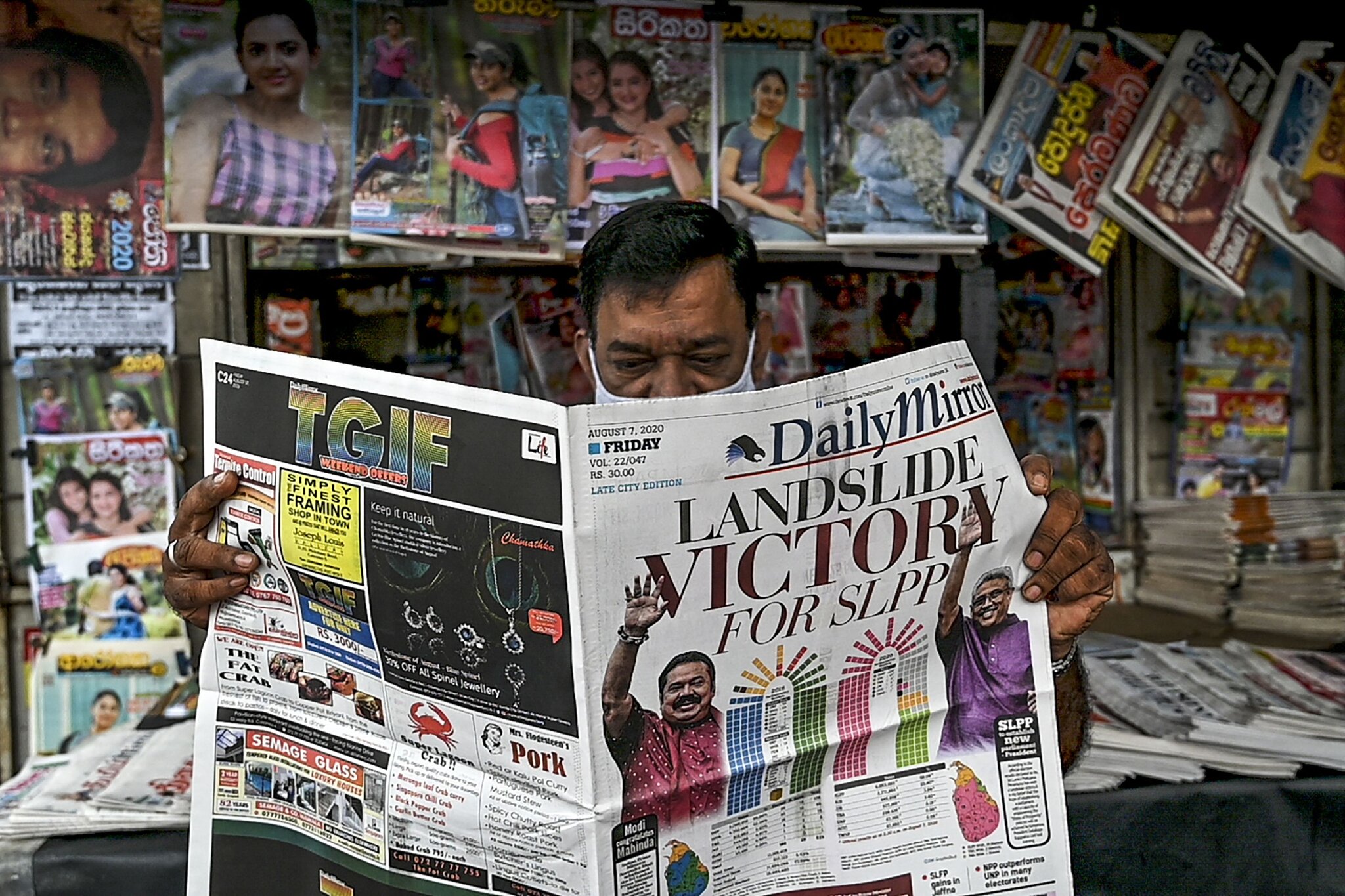Image: Ishara S. Kodikara/Agence France-Presse — Getty Images/NYT.
By Maria Abi-Habib.
President Gotabaya Rajapaksa’s governing party won a majority of Sri Lanka’s parliamentary seats, the Election Commission announced Friday, bringing the president a step closer in his quest to amend the Constitution and expand his executive power.
The Sri Lanka People’s Front expanded its majority, winning 145 of the 150 seats needed to push through expanded powers for the president and ensure that Mr. Rajapaksa’s older brother, Mahinda, will continue as prime minister. The People’s Front is expected to easily form an alliance with another party to secure the extra five seats they need to declare a super majority with the power to amend the Constitution.
After Mahinda Rajapaksa lost the presidential election in 2015, the new government passed a constitutional amendment that imposed a two-term limit on the presidency, revoked immunity from prosecution and made presidential appointments subject to parliamentary oversight.
Rights groups now worry that the constitutional amendment Mr. Rajapaksa seeks would undo those reforms at a time when the country’s opposition, activists and news media accuse the government of censorship and intensifying intimidation of critics.
The political dynasty was catapulted back into power after a five-year stint as the opposition when Mr. Rajapaksa won the presidential elections last year and promptly appointed his brother as prime minister. Mahinda Rajapaksa was president of Sri Lanka from 2005 until losing elections in 2015, and Gotabaya Rajapaksa served as defense secretary through that time, overseeing the last phases of the country’s deadly civil war that ended in 2009.

During its last stint in power, the Rajapaksa government was both beloved and reviled, celebrated and feared. To their supporters, the Rajapaksas are seen as war heroes, orchestrating the end of the conflict and ushering in a period of peace and economic growth.
To their opponents, the Rajapaksas’ last tenure in government was marked by deep-seated corruption and human rights abuses. Their government was accused of war crimes rising out of the final offensives against Tamil Tiger rebels, in which the United Nations estimates that perhaps 40,000 civilians were killed. Their administration was also accused of extrajudicial killings and heavy persecution to silence dissent and the political opposition.
Still, Gotabaya Rajapaksa won an overwhelming victory in the 2019 presidential elections, riding a wave of deep discontent with the government as the economy weakened and after multiple terrorist attacks killed more than 260 and injured over 500 on Easter Sunday last year.
“I am confident in the present government,” said M. Kalyanawathi, 72, as she lined up to vote in Piliyandala City. She praised the government for its handling of the coronavirus pandemic and its clamping down on crime.

“Democracy? Hard to think about it,” Ms. Kalyanawathi said. But “I think democracy should also be there.”
On Election Day, Wednesday, voter turnout defied expectations despite concerns about the spread of the coronavirus. About 71 percent of eligible voters cast their ballots, the Election Commission said, down about 5 percent from the last parliamentary polls, in 2015.
The high turnout was testament to the government’s apparent success in containing the pandemic. Only 11 deaths have been reported from Covid-19, the disease caused by the coronavirus, in an island nation with a population of about 21.5 million.

This election was crucial, he added, as “we hope to change the Constitution.”
Infighting and disorganization continued to plague the opposition, leaving a weakened challenge to the Rajapaksas.
Still, opposition leaders, like Eran Wickramaratne from the Samagi Jana Balawegaya party, said that despite their poor chances of routing the governing party at the polls, they would continue to try to provide a check on the president going forward.
The governing party “is mainly ruled by a family; it is an authoritarian power,” said Mr. Wickramaratne, who served in the previous government’s cabinet. “This model is dangerous. In world history, we have seen that it starts well and ends poorly,” he said, adding, “We stand for democracy.”
The polls were supposed to be held in April but were postponed twice as the government focused on containing the pandemic. Sri Lanka became one of just a few countries so far this year to hold a nationwide election.
Election results usually trickle in on the same day in Sri Lanka, but this year’s voting took longer to conduct and count than years past, officials said.
Social distancing was maintained as voters lined up at some polling stations, and many wore masks despite the sweltering, humid, midsummer heat in the tropical country. Voters were encouraged to wash their hands before taking their ballots, and water taps were provided at some polling booths while in others, officials provided hand sanitizer.

